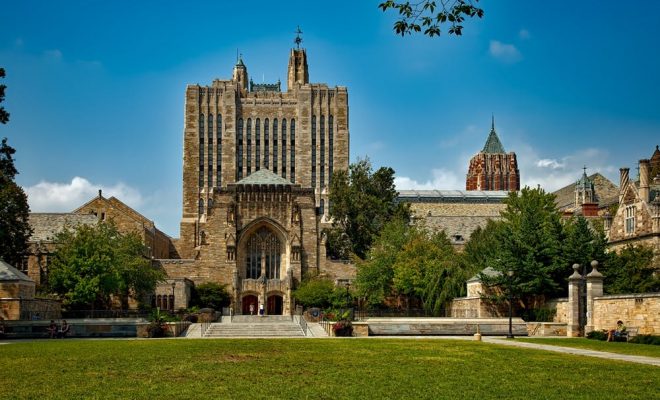2023 Best JD Programs in Education Law

Click here to learn more about the ranking methodology that we used to compile this list.
Congratulations! If you represent a college or university that is included in this list, please collect your seal below.
Lawyers do much more than argue cases in court; many play a major role in shaping law and policy throughout the United States. From private clients to the general public, attorneys essentially serve the people and many enter the profession with a desire to help others. You may be interested in law because of the potential impact you can make on the world or you may have a desire to learn something new and take on a challenging yet rewarding occupation. Either way, if you want to become an attorney, you must first obtain a juris doctor (JD from an accredited law school. Following graduation, you must also pass the bar in the state you wish to practice in.
If you could see yourself handling legal issues that arise in the field of education, then maybe education law is the right specialty for you. There are plenty of job opportunities available for those who have earned a JD in Education Law including the following:
- Judge or hearing officer
- Policy Maker or lobbyist
- Child Advocacy Attorney
- Post-secondary Educational Administrator
A graduate with a JD is estimated to earn $118,160 annually, according to the United States Bureau of Labor Statistics. According to the same statistics, availability for these positions is expected to increase over the next decade.
Best JD Programs in Education Law
The University of Houston law center has earned a reputation as one of the top law schools in the nation for earning a JD with an education law concentration. Specifically focused on higher education law and policy, the University of Houston Institute for Higher Education Law and Governance (IHELG) serves the primary goal of analysis key legal issues in higher education. Coursework focuses on education in the United States as well as internationally with the goal of stimulating dialogue and policy reform. The IHELG also provides JD students with an abundance of resources, including the higher education law library, higher education law research projects, the Houston Roundtable on Higher Education Law, study opportunities, and much more.
For consideration for admissions, applicants must have taken the Law School Admission Test (LSAT) within the past five years; scores of admitted students ranged from 166 to 170 for the Fall 2017 class at University of Houston Law. In addition to a valid LSAT score, applicants must submit their undergraduate transcripts, at least two letters of recommendation, a personal statement of three pages or less, résumé, and any other relevant information. The University of Houston Law offers a full-time JD program that can be completed in three years and a part-time JD program that can be completed in four years. To be eligible for graduation, students must successfully complete 88 credits.
Duke Law has one of the most rigorous JD programs in the country and highly respected all over the world. The courses at Duke Law are designed to prepare students for outstanding legal careers by providing a focused curriculum. One Duke Law’s standout programs is the Children’s Law Clinic, which provides students with specialized knowledge pertaining to special education law and school discipline law. Students will learn about a variety of topics related to education law and policy such as the law as it relates to public school suspension, public education for disabled students, and students’ right to receive an appropriate education. Duke Law also hosts several clinics for students in which they can learn practical skills that can be used once they enter the legal profession. Duke Law also offers online resources for students interested in education law, including information on the school-to-prison pipeline, information for attorneys and parents, as well as sample forms.
For consideration for admissions, applicants must have taken the Law School Admission Test (LSAT) within the past five years; scores of admitted students ranged from 166 to 170 for the Fall 2017 class at Duke Law. In addition to a valid LSAT score, applicants must submit their undergraduate transcripts, two letters of recommendation, a personal statement, résumé, and any other relevant information. Students must attend full-time and can earn their JD from Duke Law in three years; Duke Law does not offer a part-time JD program. To be eligible for graduation, students must successfully complete 87 credits and maintain a cumulative GPA of 2.3 or higher.
Ranked highly for trial advocacy, legal writing, and higher education law, Stetson University College of Law focuses on providing JD students with all the resources and knowledge need to excel in a specific law concentration. Stetson Law offers over 60 skills electives including coursework relevant to education law. Coursework offered includes a two or three-credit course on education law designed to give students a foundation on current legal issues in primary and secondary education in public and private schools. Topics within the course range from state regulation of education to student and teacher freedom of expression. Law & Higher Education Policy is yet another relevant course that focuses on postsecondary education law, federal and state statutes and the impact on the administration of higher education institutions.
For consideration for admissions, applicants must have taken the Law School Admission Test (LSAT) within the past five years; scores of admitted students ranged from 166 to 170 for the Fall 2017 class at Stetson Law. In addition to a valid LSAT score, applicants must submit their undergraduate transcripts, one to three letters of recommendation, a personal statement, résumé, and any other relevant information. Stetson Law offers a full-time JD program that can be completed in three years as well as a part-time program that can be completed in four years. Stetson Law does not conduct admissions interviews and all applications will be notified of their admissions status via email. To be eligible for graduation, students must successfully complete 88 units and have a cumulative GPA of 2.25 or higher, and satisfy ABA upper-level writing requirements.
University of Miami College of Law (Miami Law) stands out as a law school that is highly focused on student success. This is evidenced by its smaller class sizes and specialized courses offered for JD students. All first-year (1L) students take Elements of Law and Communications and Research Skills courses, both of which are designed to give students a deeper understanding of the learning process and how the law has evolved. For those interested in coursework specific to education law, Miami Law offers courses like Race and Class in American Public Education: Access, Equity, And Reform as well as the American Public Education Law Seminar.
For consideration for admissions, applicants must have taken the Law School Admission Test (LSAT) within the past five years; scores of admitted students ranged from 155 to 160 for the Fall 2017 class at Miami Law. In addition to a valid LSAT score, applicants must submit their undergraduate transcripts, two letters of recommendation, a personal statement, an optional résumé, and any other relevant information. Students must attend full-time and can earn their JD from Miami Law in three years; Miami Law does not offer a part-time JD program. To be eligible for graduation, students must successfully complete 88 units and have a cumulative GPA of 2.0 or higher, and satisfy ABA upper-level writing requirements.
Located in San Francisco, Golden Gate University School of Law offers a comprehensive education law curriculum intended to give JD students a solid foundation to build upon once they graduate and begin practicing. Golden Gate Law’s education law seminar assists students in exploring the relevant policy issues and the legal framework that characterizes public education. In addition, students learn how education law currently functions, how policy decisions are made, how the law is related to the public school system, s well as the policy goals of public education and how lawyers can advance these goals.
For consideration for admissions, applicants must have taken the Law School Admission Test (LSAT) within the past five years; scores of admitted students ranged from 166 to 170 for the Fall 2017 class at Golden Gate Law. In addition to a valid LSAT score, applicants must submit their undergraduate transcripts, two to four letters of recommendation, a personal statement, résumé, and an optional application addendum. Golden Gate Law offers a full-time JD program that can be completed in three years as well as a part-time program that can be completed in four years. Students must maintain a cumulative GPA of 2.75 or higher and satisfy ABA upper-level writing requirements to be eligible for graduation.
How to Choose the Right Program
You can choose the JD program based on your future career aspirations and the academic course load each school provides. Some will focus more specifically on secondary public and private education, while others give you a greater opportunity to study higher education law. After this, you can rank schools by convenience, price, and accreditation.
Who accredits a JD with a concentration in education law program?
Understanding the accreditation schools possess is the key to ensuring that you receive a top-notch education that will prepare you for a future in the legal profession. Every school, including online programs, will have to maintain some type of accreditation with state, regional or national accrediting agencies. The American Bar Association (ABA) is the main accrediting body for the law schools in the United States. All states, with the exception of California, will not permit an individual to take the bar exam if their JD was not issued by an ABA-accredited institution.
Beyond this accreditation, many will opt to maintain voluntary status with Distance Education Accrediting Commission. This accreditation mainly applies to online or correspondence programs and serves to hold the schools accountable for offering a well-rounded curriculum that adequately prepares students for the future. The top schools listed here offer traditional, in-person programs but it should be considered before you make a choice.
How long does it typically take to get a JD?
Most US law schools allow you obtain your juris doctor in three years for full-time students or four years for part-time students. Some law schools allow students to take more time to complete their degree depending on the timing of the courses offered and your enrollment date.
What does the curriculum include?
The modern JD curriculum typically includes an overview of the law, which includes law derived from precedent rather than statutes (also known as common law) as well as how the law has advanced as we know it today. Common first-year courses include Constitutional Law, Torts, Property, Contracts, Legal Writing and Research, and Civil Procedure.
Most law school curriculums also focus on effective communication, both written and verbal. These skills are critical to success as a law student and as a practicing attorney. In addition to required courses, law schools offer elective courses designed to facilitate a thorough legal education. Electives provide specific instruction in a variety of legal sub-specialties, including education law.
How can I finance my education?
Obtaining your JD can be an expensive endeavor. You can finance this dream by applying for financial aid and grants through the Free Application for Student Aid (FAFSA). Grants offered by the federal government do not need to be repaid upon graduation.
Some of these top law schools will also have scholarships available to eligible students on a first-come-first-served basis. These scholarships will not need to be repaid but might be based on your grades, test scores, and other criteria. Similar to a scholarship, some colleges will offer work-study programs that allow you to work off your debt in various positions both on and off campus.
For the remaining amount, you might consider taking out a student loan that can be paid back upon graduation. Look for loans that have a low interest rate and don’t impose a penalty for prepayment. The federal government tends to offer more advantageous loan programs compared to private lenders.
What are the employment prospects for a JD with a concentration in education law graduate?
Understanding the employment prospects for those who receive their juris doctor can vary based on the unique career path you decide to tke. To give you an idea of what is expected for this field in the coming years, we will take a look at the most popular careers that many people with this degree choose to pursue. All data is based on the figures available from the United State Department of Labor based on projections made from 2016 to 2026.
Lawyers: Individuals with a JD should see an eight percent increase in the number of jobs available over the coming decade. It is growing roughly the same as the average employment rates in the country. There are currently 65,000 positions with this title and the median pay for attorneys is $118,160.
Judges and Hearing Officers: Judges and hearing officers overseeing the legal process in courts, conduct hearings, resolve administrative disputes and issue legal decisions. Individuals who pursue this occupation should expect to see a five percent increase in the number of jobs available over the coming decade. It is growing slightly slower than the average employment rates in the country because many of these positions require an election process. There are currently 43,800 positions with this title. If you are able to secure a position with the federal government, you can expect to earn approximately $123,060 annually.
Education administrators, postsecondary: JD graduates can expect to see a 10 percent increase in the number of these positions by the year 2026. There are currently 180,100 positions with this title and the expected annual salary is $93,270 for positions at colleges, universities, professional schools and $84,090 for positions at junior and community colleges.







